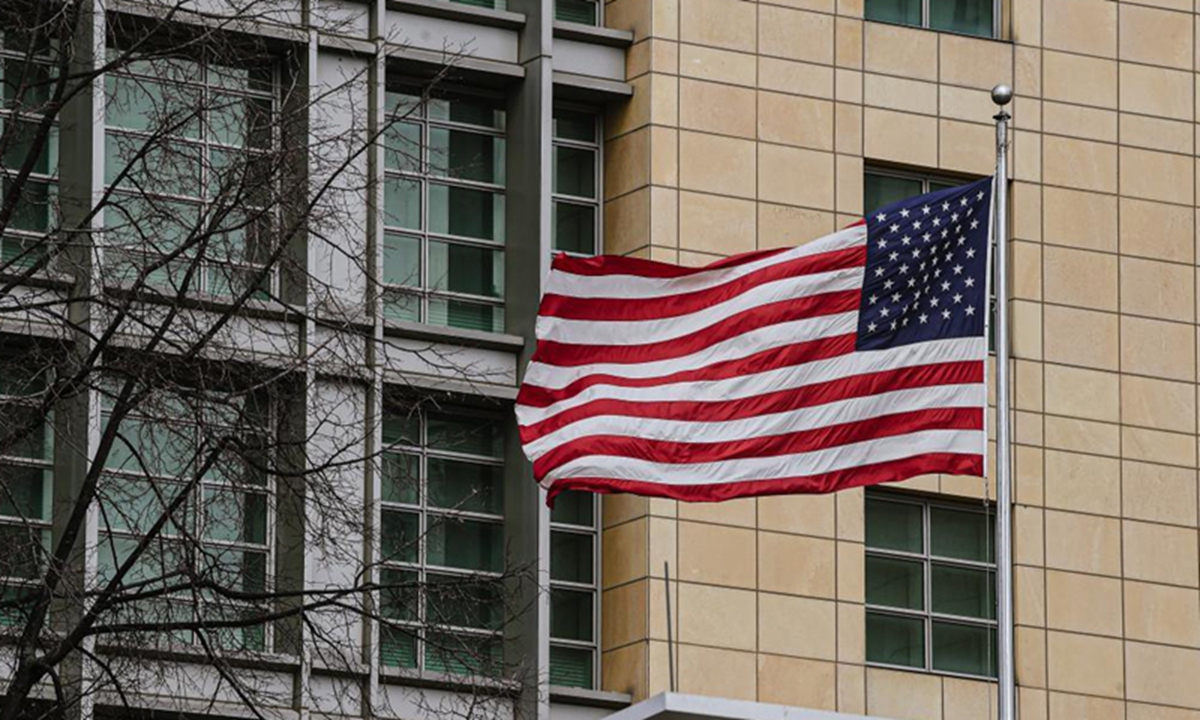
The US flag waves in the wind at the U.S. Embassy in Moscow, Russia. Photo: Xinhua
Russian Finance Minister Anton Siluanov has said that $300 billion of the country's gold and foreign exchange reserves have been frozen due to sanctioning measures imposed by the US and its allies over the conflict in Ukraine, accounting for nearly half of the country's total foreign exchange reserves.
The US' move has largely weakened Russia's capacity to intervene in the ruble's exchange rate leveraging its foreign exchange reserves. Now, the exchange rate for the Russian ruble has plummeted. It also restricts Russia's financial settlement capacity. With one US credit rating agency claiming Russia's sovereign bonds could face default risks, whereas Russia said it would use ruble to pay its debts because its foreign exchange reserves were frozen.
Following WWII, the world's largest gold vault was on the basement floor of the Federal Reserve Bank of New York, and many countries' central banks had some amount of gold storage in the US. In the 1960s, due to rising distrust in the dollar, then French government demanded the US return Frances' gold.
Meanwhile, the world's largest trading market for gold is also in the US. Central banks across the world also participate in normal gold transactions in order to maintain and increase the value of their gold assets. To participate this kind of trading, countries open accounts in the US market. This time, the gold assets of the Russian central bank frozen by the US also refers to the assets of the gold account of the Russian central bank participating in international financial transactions.
After the US froze half of Russia central bank's gold and foreign exchange reserves, Russia's domestic and foreign economic activities have been severely restricted, which has drawn the world's attention to the Russian central bank's gold reserves. The lesson from the Russia's gold this time is to store a certain amount of gold reserves in a country's central bank now seems more valuable than ever.
The US has led the establishment of an international political system with the UN at its core and a world economic and financial order, value chain, and industrial chain supported by the World Bank, the International Monetary Fund, and the predominance of the US dollar. These structures are the order that best suits the long-term interests of the United States only.
Today, with its hegemonic power, the US is constantly undermining the foundations of the post-war world political and economic system. In recent years, there have been many cases of freezing the assets of other countries' central banks, such as the UK freezing Venezuelan's gold, the US freezing $7 billion in Afghanistan's assets, and this time, the US froze the Russian central bank's assets worth $300 billion.
The most important thing in financial markets is credibility. The loss of credibility is more serious than the loss of gold. Once the US defaults on the gold on other countries, the biggest loss is the credibility of the US on the international financial market. Credit bankruptcy in financial markets is not something that can be measured by a few hundred tons of gold.
The actions of US politicians to freeze the national assets of Russia will cause serious damage to the credibility of the US government and even more damage to the post-war international financial order and the financial system. The backlash and consequences of these actions will be clear for all to see over a period of time.
The author is an associate research fellow of the Institute of Russian, Eastern European and Central Asian Studies under the Chinese Academy of Social Sciences. bizopinion@globaltimes.com.cn
